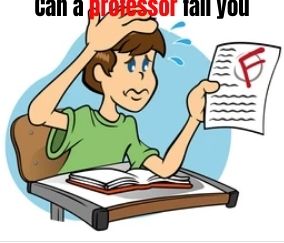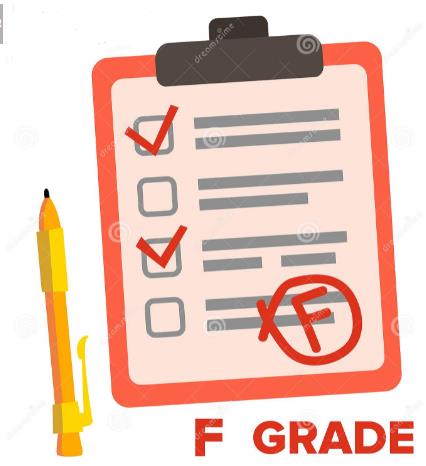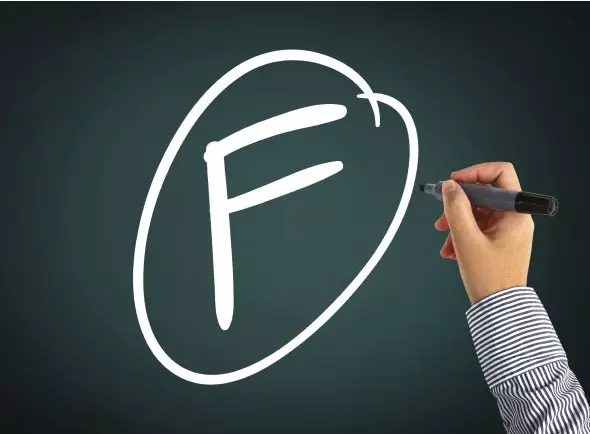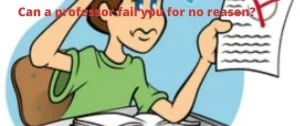No sane person will want a student to fail, not even the teacher. In fact, teachers will want people to pass the class so that it can show his or her success. However, if you have an issue with your teacher or cannot follow instructions, failing is an option.
If you have no good report with your professor, then you have a reason to worry. But Can it really go to those extents? Can someone really fail you on purpose?
Your professor cannot try to fail unless you fail to adhere to course expectations. This is because it is in his best interest for you and other students to pass. However, in a few circumstances, a professor can fail a student on purpose if they seriously deviate from class guidelines or intentionally fail to deliver academic expectations.
How to know that you might fail
The teachers’ body language and how he or she treats you can be an indicator to you on whether you are on course to being deliberately failed.
Assume that you are the best in your course but your teacher keeps on picking on you or rather yelling and shouting at you for flimsy reasons just to justify their dislike towards you. This can be an indicator of imminent failure from the teacher.
Moreover, the teacher can issue assignments or give examinations that have never been taught in class or simply fail to follow the course outline in testing. Is this not a way to make students fail?
Can a Professor Fail You for No Reason?
No. It is not possible for your professor to fail you for no justifiable reason. The professor being human can dislike you or your personality to an extent of feeling like failing you and they do have their bias.
However, institutions have policies in place relating to examinations and therefore they cannot drift beyond them. On top of that, there exists a strict code of teaching that specifies the awarding of grades purely based on academic work.
Reasons Why a Professor Can Fail You
1. Unpleasant Behavior
A teacher can decide to fail students based on their behavior in class. Normally teachers do well with students who are disciplined, focused, and cooperative in class.

Students who in a way frustrate their teacher risk being failing in their tests and exams.
Some of the things that might make a teacher do these include students being disruptive during lessons, rude and dishonest.
Moreover, some professors have failed students’ because they feel that the students do not live up to the institution’s standards, hence lack honor and maturity to pass.
They see them as not having the quality, competence, and desire to succeed.
2. Poor Preparation
Some students think that they do not need to study and so they ignore their learning materials or resort to cramming content when approaching exams.
When their professor notices this, it appears that the students do not really care or are not putting in any effort at all.
Some go to an extent of not filling in the blank spaces and failing to write the required answers. If this happens, it might leave the professor with no choice but to fail the students.
3. Students Missing Classes
Students might also miss too many classes to the professors liking while others go to an extent of not attending at all. On top of that, some do not take assignments or fail to turn them in.
On the other hand, there exist students who indeed attend classes but fail to pay attention to homework instructions or fail to totally do the homework and risk being failed.
4. Failure to Take Advice
Professors expect that whatever directions and suggestions relating to assignments and examinations they give to their students are correctly and carefully implemented by the students and so when these have not adhered to the professor will definitely not like it.
These may be in terms of outlook, layout, or changes in an assignment or rather presentation of work during an examination. To the professor, this may come out as stubbornness from the student.
The professor expects the students to show how answers have arrived should they be required. If you do not do all these, you might fail.
How to Handle when a Teacher is Purposely Failing you
What the Student Can Do?
The student can contact their professor through email or rather if possible meet them face to face in a meeting. This will aid in discussing more the grades the student feels were unfairly awarded to him/her.
The student should be in the possession of all the paperwork so as to assist in validating claims during the meeting. Some institutions do have academic advisors who can be involved before seeking redress from other available quarters or higher offices.

Alternatively, should the above fail, the student can create a conflict resolution avenue by involving an ombudsperson within the relevant department.
Though it will be an informal avenue, it offers arbitration before matters become formal.
In case a student fails to agree or totally does not get an audience with the professor, the student can move to the college dean with proper documentation of results and reasons as to why he/she feels that they purposefully failed.
In the event of an appointment, the student should present the case in a factual manner without demeaning the professor in any way.
If anything, a student needs to go to maximum lengths if they feel that they were deliberately failed. This will help to soften your professor to change the final grade and at least escape the consequences.
This might be crucial in reversing the grade as it provides the student with a platform for arguing out why they feel they deserve better.
What the School Can Do
When a teacher purposefully fails the students all is not lost to them since they can employ certain interventions in order to be heard by the relevant quarters in charge of academics at their institution.
The school definitely has a structure and hierarchy that deals with academic matters relating to such. For example, if there is a professor who gave a wrong grade, he can be summoned by the faculty.
It can therefore decide to reevaluate the academic performance of the students with a view of fact-finding which can lead to the alteration of the grade given by the teacher.
The school can end up canceling all those results deemed to be unfair by the students and award what it feels is a correct reflection of the students’ abilities. This can happen if most students are failing in class and the professor can remember.
This can be done through the coordination from the dean of academics and the various academic committees in place in line with the institutional policies.
The grading at times can be altered by the teacher to trigger the failure of the students. These can be adjusted by the school so as to normalize performances to be distributed normally.
The teachers on the other hand can be questioned by the supervisors within their departments on why the whole class failed and should there be no concrete reasons, then measures can be taken in relation to the same but according to college policies.
What Happens when a Professor Fails Students
Normally, the professor is usually under a department headed by a dean.

This implies that they are answerable to the dean and so should the entire class fail, the blame will squarely lie on the professor and not the students.
It is no secret that the professor’s job is to assist the students in their course since he/she is an expert in that particular field and therefore mass failure of the class would no doubt be questioned.
Moreover, parents will also be on the dean’s neck demanding to know the reason as to why all the students in that class failed in that particular course.
This ultimately will put the blame on the professor for failing to properly guide the students thus putting him /her at loggerhead with their department head or rather the dean.
The department chair on the other hand would not like such a scenario to occur since it will be a reflection of the department as a whole and to a larger extent the entire institution.
These complaints and interventions will force the professor to review the students’ grades through curves in order to ensure that grades spread until all the deserving students pass.

Joseph is a freelance journalist and a part-time writer with a particular interest in the gig economy. He writes about schooling, college life, and changing trends in education. When not writing, Joseph is hiking or playing chess.
